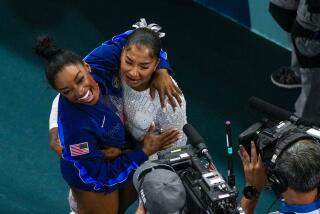Arizona company trained Chinese for London Olympics
- Share via
PHOENIX — Marty Weems was watching the Olympics on his office computer here the other day, cheering on his favorite athletes. But the competitors weren’t Americans — not by a long shot. They didn’t even hail from the same continent.
He was rooting for Chinese rower Zhang Xiuyun as she willed her way across the water’s surface, fist-pumping her to a leading time. And he hooted and clapped as Chinese table tennis teammates Li Xiaoxia and Ning Ding captured the gold and silver medals, respectively.
For Weems, his patronage is personal. He has gotten to know all three women, who are among hundreds of Chinese athletes and coaches — many of them Olympians — who have spent time training for major sports events outside the realm of their normally secretive homeland, in a Phoenix sports facility Weems helps run.
As the world of athletic competition grows ever smaller, an increasing number of international athletes consult with training experts on foreign shores. But during these Olympics, as the U.S. and China duke it out — medal for medal, neither truly trusting the other — Chinese contestants and their U.S. trainers might seem to make for some strange bedfellows.
But for Weems — a vice president of the Phoenix-based Athletes Performance — it doesn’t work that way. For several weeks this year as each visited his facility, Weems drank tea and exchanged personal stories with the foreign competitors. He’s stood a few feet from the pingpong table as Li and Ning sweated and battled each other with incredible finesse. And he’s listened to stories about Zhang’s young daughter and the rower’s thoughts about being a 37-year-old Olympic athlete, considerably over the hill in the view of many Chinese.
And so when people ask him if he’s doing the sports version of abetting the enemy, an act tantamount to allowing Civil War Confederates to train in Union camps, Weems, 42, can only shake his head.
“When we train a German or a British athlete, no one asks that question, but for some reason it always comes up with the Chinese,” he said. “If you look at the name of our company, it doesn’t say American Athletes Performance. We’re a haven for all athletes, including these Chinese women, whom I feel I have gotten to know in some small way. So you find yourself rooting for them. And your heart breaks a little harder when you see them struggle. I root for athletes, not teams or nations.”
No statistics exist on how many Chinese athletes train in the U.S. or at how many different venues. And although Athletes Performance is not the first U.S. training concern to do business with Beijing, these days it seems to be bringing in the lion’s share of China’s sports consulting business.
Hundreds of Chinese athletes have trained in Phoenix for stints as long as six weeks — with a few visiting the company’s Los Angeles facility — and more than half a dozen of the firm’s trainers have traveled to China to work with athletes. They’ve helped guide some of the country’s most prized Olympic sports efforts, including diving, gymnastics and volleyball.
Company Chief Executive Dan Burns sees more cross-border relationships in the future. “The world has gotten very, very flat from a sports perspective,” he said. “Our mission is to support athletes. Competitors from China, the U.S. or any other nation have similar dreams and needs. We don’t see geographic barriers to what we do.”
Athletes Performance offers an integrated regimen of physical training, diet and therapy. Since its start in 1999, clients have included athletes from many nations and sports. They lounge in the hyper-modern training facility in northern Phoenix bearing the colorful jerseys of competitors around the globe: foreign-born NHL athletes, English Premier League soccer teams, the German national soccer team, Indian field hockey players and eliteU.S. military and firefighting athletes — paying a cost that ranges from $600 to $2,500 a week.
In 2009, company officials were invited to give a lecture at Beijing Sport University. Eighteen months later, they were back in China, speaking in two more cities. In April 2010, the first Chinese athletes began arriving in Phoenix, their coaches and translators in tow.
Weems has been at the front lines of much of the cross-cultural work. Hailing from Tennessee, he’s a longtime athlete who once dreamed of playing Olympic baseball. A fit-looking man with a quaint Southern drawl, who uses the phrase “dad-gum,” his business card is decidedly international: English on one side, Chinese on the other.
His first challenge with Chinese athletes wasn’t about training, but food. Though Athletes Performance doesn’t offer residences to training athletes, meals are available on-site, which posed a question for Weems: What do Chinese eat?
They solved the problem by inviting athletes into the kitchen to demonstrate to chefs the ingredients they prefer. They’ve also consulted with the president of the Chinese Restaurant Assn. in Phoenix to help create distinctive cuisines from Hong Kong to Beijing.
They’ve also worked to get some Chinese competitors to change their diets. “Some of their food is high in oil and fat; skin left on meat, bones included, high on rice, light on vegetables,” Weems said. “We’re trying to get them to make small changes in their variety of carbohydrate sources.”
Trainers have tried to tweak training regimens for Chinese athletes, many of whom still use the old Soviet model of repetitive drills, introducing strength training that Weems says will “help their skills better express themselves.”
But the Chinese have impressed him with their fierce determination and concentration of repetitive drills, punctuated by naps and socializing. He says China has gotten a bad rap for its training procedures, in which young athletes work in isolation from their families for years at a time.
The father of Chinese Olympic diver Wu Minxia recently told the Shanghai Morning Post about the sacrifices of being the parent of an elite athlete in China. “We’ve known for years that our daughter doesn’t belong to us anymore,” he said. “I don’t even dare to think about things like enjoying family happiness.”
Weems says the closest U.S. comparison is college football. “For many athletes, team becomes family,” he said. “Ask the parents of these players about the frequency and volume of their contact with their child once the training season begins, and they’ll tell you that it isn’t what they’d like it to be.”
Weems and Burns believe they’ve been accepted as worthy training consultants by their clients. On a recent visit to Beijing, Burns said, he was good-naturedly hazed by his hosts, who encouraged him to drink hearty amounts of alcohol and eat dishes like jellyfish.
“The texture of that jellyfish I will never forget,” Burns said. “I remember trying to keep a very straight face, with my hosts saying, ‘You are more than a gentleman, you are a man.’”
Weems arrived in London on Saturday to cheer on some of the Chinese athletes his company has trained. And he doesn’t have to worry about scoring the impossible-to-acquire event tickets: The Chinese Olympic Committee has taken care of that.
More to Read
Sign up for Essential California
The most important California stories and recommendations in your inbox every morning.
You may occasionally receive promotional content from the Los Angeles Times.











